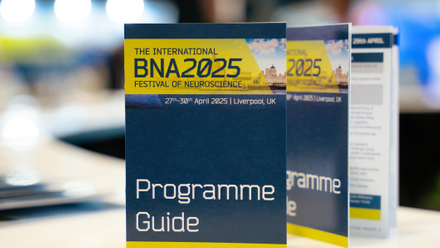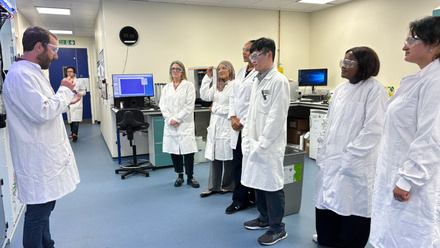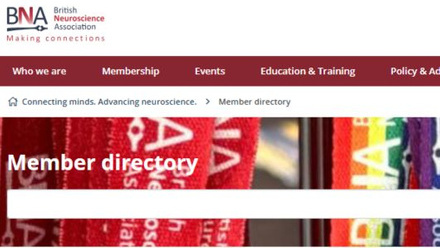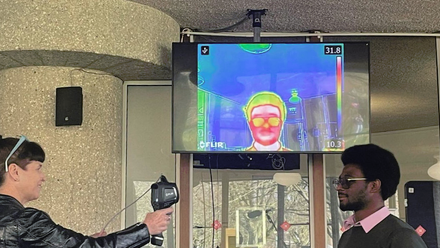BNA Scholars Design and Host "Brain Sciences Symposium" aimed at supporting Early Career Researchers from Underrepresented Backgrounds
Last November, all current cohorts of the British Neuroscience Association's BNA Scholars Programme – with the support of the Association of the British Pharmaceutical Industry (ABPI) and Imperial College London's Department of Brain Sciences – offered an inclusive and supportive platform for students and early career scientists to explore cutting-edge advancements in neuroscience while providing practical guidance for academic and professional development. With everything – from the speaker choices to the design of the physical programme and the hosting of the event itself – being designed by the BNA Scholars according to what they had assessed to be the greatest needs among the next generation of researchers, there was a strong emphasis on inclusivity and accessibility. The event welcomed attendees from underrepresented backgrounds and featured a hybrid format, allowing those unable to attend in person join live-streamed sessions. The following meeting report has been written by one of the BNA Scholars, Sahar Uppal.
The BNA Scholars' Early Career Symposium – the first in what we hope will become a biennial event – was an incredible success, and we want to extend a huge thank you to the BNA, ABPI and ICL Brain Sciences for their generous support, to our speakers for sharing their time, expertise and perspectives, and of course to our attendees for their enthusiasm and engagement.
BNA Scholars welcome attendees / Statistics on EDI in neuroscience - IMAGE x 2
Navigating Neurotech
The symposium started with a glimpse into the innovative and diverse approaches currently advancing neuroscience research, with talks from Dr Naureen Ghani (Sainsbury Wellcome Centre) and one of our own BNA Scholars Morgan Mitchell (University of Oxford).
Dr Ghani shared her research on the neural mechanisms driving decision-making processes in mice. Her work explored how sensory information is combined with previously learned behaviour, using behavioural measures tailored to align with natural tendencies and behaviours to avoid imposing artificial constraints. This research was both valuable and engaging for attendees to learn about, highlighting the importance of ecologically valid experimental design while adding insight into the brain’s decision-making processes.
Morgan then presented her PhD research exploring the use of targeted memory reactivation during sleep as an intervention for stroke rehabilitation. Morgan explained how using specific sensory cues associated with prior learning can stimulate the reactivation of neural pathways involved in those memories, to possibly improve retention. Morgan’s work focuses on how this could potentially aid in motor recovery in stroke patients by enhancing the process of relearning movements affected by stroke-induced damage. Learning about the cutting-edge technology used in her work was fascinating, providing attendees with a deeper understanding of how innovative neuroscience research can be applied in clinical settings to address real-world challenges.
Dr Ghani - IMAGE
Exploring Psychedelic Drug Development
Rayyan Zafar gives his presentation - IMAGE
Following this, Dr David Erritzoe and Dr Rayyan Zafar from Imperial College London's Centre for Psychedelic Research discussed ongoing research and advancements in psychedelic drug development. Dr Erritzoe, the clinical director of the Centre, began by discussing the therapeutic potential of psychedelics, particularly in treatment for psychiatric disorders. By acting on critical parts of the brain’s networks involved in mood regulation, cognitive flexibility and emotional processes, psychedelic therapy may induce significant long-lasting improvements in mental health and wellbeing. Dr Zafar then built on this, introducing his innovative research exploring the use of psilocybin as a novel treatment for gambling addiction. He explained how gambling addiction is a behavioural disorder characterised by impaired decision-making and compulsive behaviour. Dr Zafar also noted the current challenges in addressing gambling addiction through conventional therapies and highlighting the need for new approaches. His work focuses on how psilocybin targets the 5-HT2A serotonin receptors during controlled psychedelic experiences to facilitate emotional and cognitive shifts, which could allow individuals to rewire their thinking and form healthier coping mechanisms. This session informed attendees about the potential of psychedelic therapies to transform mental health care, and the importance of breaking down stigma and misconceptions around psychedelics.
Workshop: Writing Winning PhD and Grant Applications
The symposium also featured practical workshops by Donald Lush and Dr Tony Woods supporting students and early career researchers to take a sure-footed next step on their career pathways.
Donald Lush – a careers consultant at King’s College London – delivered an insightful session breaking down what pursuing a PhD entails, including working independently while contributing to a research team. The session addressed core characteristics and skills prospective PhD students should cultivate, such as perseverance, curiosity and critical thinking skills. He also shared insights into crafting a compelling PhD application to demystify the application process, and providing attendees with a clearer idea of how to stand out as an applicant.
Donald Lush IMAGE
Following this, Dr Woods – a programme manager at King’s College London – covered another critical milestone in a research career: securing funding for a research project. This session focused on the "do"s and "don’t"s of grant writing. Dr Woods used real world examples to provide context, emphasising the importance of tailoring the proposal to the specific funding body and its mission, demonstrating feasibility and articulating how the project is innovative and advances the field. He also addressed common pitfalls, illustrating how small changes in language and structure can significantly influence the outcome of a grant application.
Dr Tony Woods - IMAGE
Together these workshops empowered attendees for big career steps by providing advice on how to communication persuasively and stand out as an applicant.
The Importance of Lived Experience
In addition to discussing the developments in the world of neuroscience and learning about application writing, the thought provoking and insightful talk by Dr Francesco Tamagnini highlighted the importance of prioritising wellbeing and need for systemic change in academia. Drawing from his own extensive experiences, Dr Tamagnini spoke candidly of his career path to becoming a Lecturer in Pharmacology at the University of Reading. His talk resonated with many of the attendees, as he addressed some of the serious challenges in academia while providing valuable advice on navigating the pressures of academia. He emphasised the importance of setting boundaries, building a support network and adopting a sustainable working approach to maintain mental health, offering attendees a valuable perspective to help them navigate their own academic journeys.
Dr Francesco Tamagnini - IMAGE
Neuroscience and Society
The day concluded with a lively panel discussion bringing together a diverse group of experts including Dr Daniel Glaser from the Royal Institution, Dr Chris Timmermann from the Centre for Psychedelic Research and Dr Jessica Jiang from UCL. The discussion explored multiple themes such as inclusivity in research, the intersection of art and science, and the transformative role of AI and technology in understanding the brain. Dr Jiang highlighted the need to engage underrepresented communities and broaden participation in ongoing research, sharing specific strategies to enhance diversity in study populations and improve relevance and applicability of the outcomes. Dr Glaser addressed the importance of clear, relatable communication for the public to foster a dialogue with diverse audiences. Dr Timmermann shared insights into how this is particularly essential in psychedelic research, as transparent and evidence-based communication is key in breaking down stigmas.
These discussions illustrated the importance of effective science communication and societal impacts of neuroscience research, offering a well-rounded perspective on the field of neuroscience.
Attendees network with speakers and each other - IMAGE
Behind the Scenes
Organising the symposium required meticulous planning and collaboration to create an inclusive and impactful event. We put a focus on encouraging participation from students and early-career researchers from underrepresented backgrounds and designed the event to be welcoming and accessible to all.
Of her experience at the event, Safiya Abidali (Applied Neuroscience MSc student at Kings College London), said via Instagram:
"Thank you to the @britishneuroscienceassociation, the Association of the British Pharmaceutical Industry (ABPI) and @imperialcollege for hosting us and thank you to the brilliant neuroscientists who came to share their research with us. This field continues to amaze me, from humans to rodent models, depression to psychadelics, sleep and memory consolidation, PhDs to grant funding.
There are so many avenues and roads to take in this field, there are so many opportunities and it is often hard to choose your path. I have left with a lot to think about, but mostly I just want to embrace the journey, even if I don’t know what my final destination is."
The BNA Scholars' planning process involved discussing logistical and programmatic details and addressing all factors necessary to ensure the event’s success. Balancing venue capacity with expected attendance was a key consideration, and a hybrid format was essential to reach a wider audience including those who were unable to attend in person. The Department of Brain Sciences at Imperial College London generously provided a venue at Scale Space, White City which was perfectly equipped to accommodate in-person and online attendees.
The team designed the event to offer a diverse range of sessions, including panels and workshops from a broad range of expertise to provide attendees with a well-rounded educational experience. This was then advertised through multiple communication channels to build momentum leading to the event. Regular meetings throughout were critical in the planning process to share updates and address challenges. A special thanks goes to Arish Mudra Rakshasa-Loots for spearheading these discussions, and to Dani Wijesinghe for their invaluable support in coordinating logistics and communications. Their efforts, along with the contributions of the entire team, made the symposium a seamless and memorable experience for all involved!
BNA Scholars proudly present their Symposium - IMAGE
The British Neuroscience Association is always looking for individuals and organisations with a strong EDI commitment who can work with us to continue building a supportive neuroscience community through the BNA Scholars Programme. If this could be you, please contact Charlotte Shepherd (Development Director) on [email protected] briefly describing organisation's activities and research interests, as well as why you want to support the Programme and what you think your organisation could contribute. Please also ensure that you attach your organisation's equality, diversity and inclusion policy, or similar.
You can find out more about the BNA Scholars Programme here, and more about being a Supporter here. {ADD LINK}





